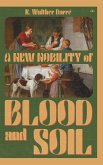Contains:
The namesake of this book—“Die Fahne Hoch,” or “Raise the Flag”—is a song written by Horst Wessel as a fighting song for the SA. After his martyrdom, it was adopted as the official anthem of the NSDAP and later as the national anthem of the Third Reich itself, as the Horst-Wessel-Lied. The three biographies in this collection are not so much dry factual recitations as they are passionate eulogies for a young man who laid down his life for his country, driven by idealism and a fanatical love for his people. Horst Wessel’s stature as an icon of the Third Reich achieved such heights that the legend of his life and death crosses into the territory of founding mythology for National Socialist Germany.
Horst Wessel served as an example to the youth of a defeated and desperate nation, a shining illustration of the value of courage and devotion, and proof that noble deeds often far outlive one’s own life and even the original circumstances in which they were made. Antelope Hill is proud to bring these short biographies together in one collection, Die Fahne Hoch, newly translated for the English reader.
- Horst Wessel: Life and Death, by Erwin Reitmann
- SA Sturmführer Horst Wessel: A Portrait of a Life of Sacrifice, by Fritz Daum
- Horst Wessel: Through Storm and Struggle to Immortality, by Max Kullak
The namesake of this book—“Die Fahne Hoch,” or “Raise the Flag”—is a song written by Horst Wessel as a fighting song for the SA. After his martyrdom, it was adopted as the official anthem of the NSDAP and later as the national anthem of the Third Reich itself, as the Horst-Wessel-Lied. The three biographies in this collection are not so much dry factual recitations as they are passionate eulogies for a young man who laid down his life for his country, driven by idealism and a fanatical love for his people. Horst Wessel’s stature as an icon of the Third Reich achieved such heights that the legend of his life and death crosses into the territory of founding mythology for National Socialist Germany.
Horst Wessel served as an example to the youth of a defeated and desperate nation, a shining illustration of the value of courage and devotion, and proof that noble deeds often far outlive one’s own life and even the original circumstances in which they were made. Antelope Hill is proud to bring these short biographies together in one collection, Die Fahne Hoch, newly translated for the English reader.









